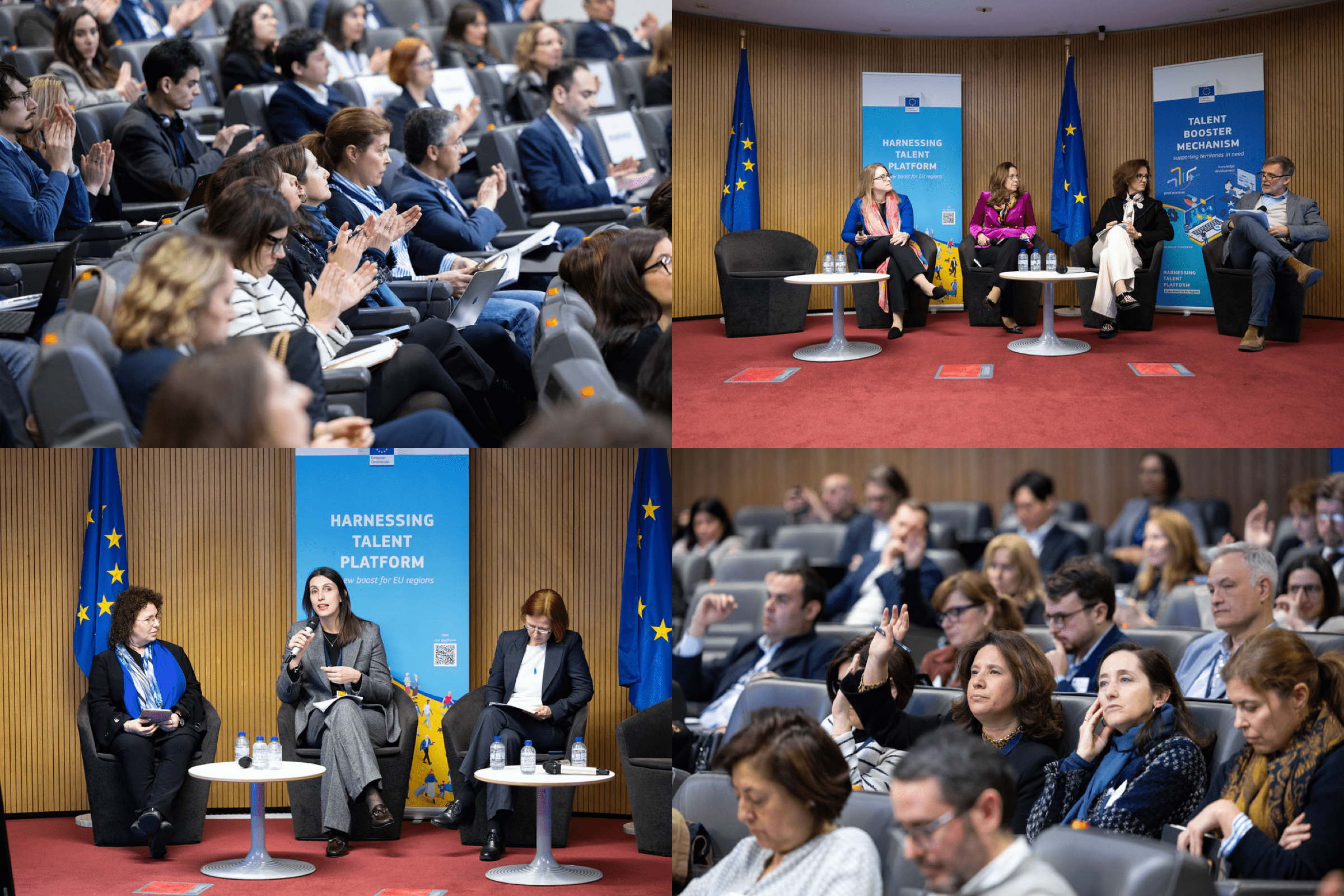TALENT BOOSTER MECHANISM IN ACTION
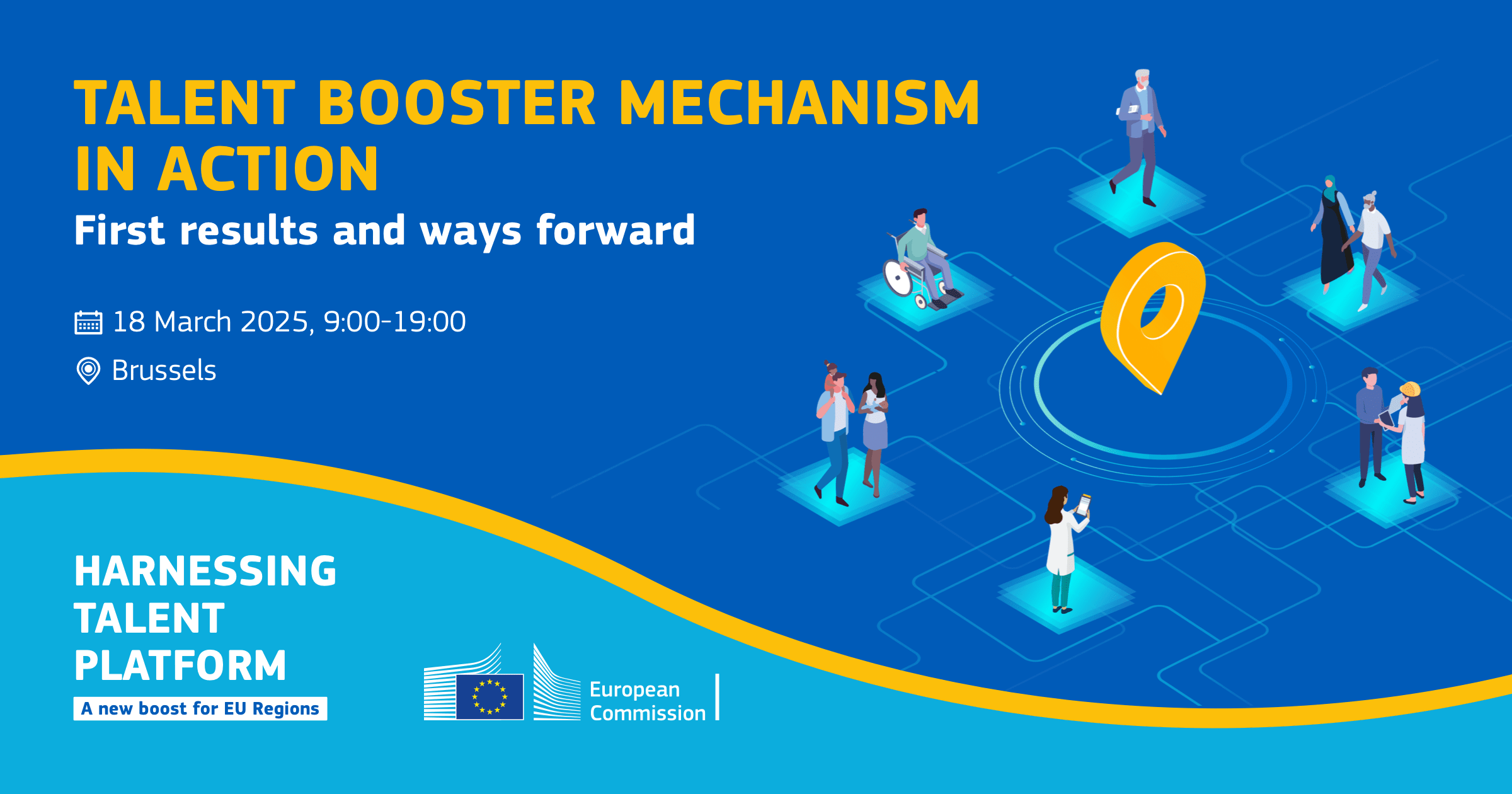
Description
The second ‘Harnessing Talent’ event with the headline theme “Talent Booster Mechanism in action: first results and ways forward" was held in Brussels, Belgium on 18 March 2025. Hosted by the Commission’s Directorate-General for Regional and Urban Policy (DG REGIO), the event was attended by 120 key stakeholders from EU-level institutions and organisations, regional and local representatives and more that 600 online viewers.
Delving into the comprehensive support provided through the eight Pillars of the Talent Booster Mechanism, the event represented a platform to reflect on the significant role of Cohesion Policy in addressing demographic changes and leveraging talent across the European Union's regions. Participants explored ways to make regions more appealing places to live and work, focusing on the importance of professional development opportunities, quality of life, and access to essential services.
Nicola De Michelis, Acting Deputy Director General of DG REGIO delivered the opening remarks and highlighted that EU’s demographic challenges limit economic diversification and risk deepening territorial disparities if not addressed, leading to citizens feeling left behind. Against this backdrop, the Talent Booster Mechanism continues to deliver support to regions faced with a shrinking working age population and youth outmigration, thus reinforcing Cohesion Policy action. He stressed the importance of the mid-term review of programmes in 2025 as a timely opportunity to re-assess where investments could be most impactful for regions to adapt to demographic change.
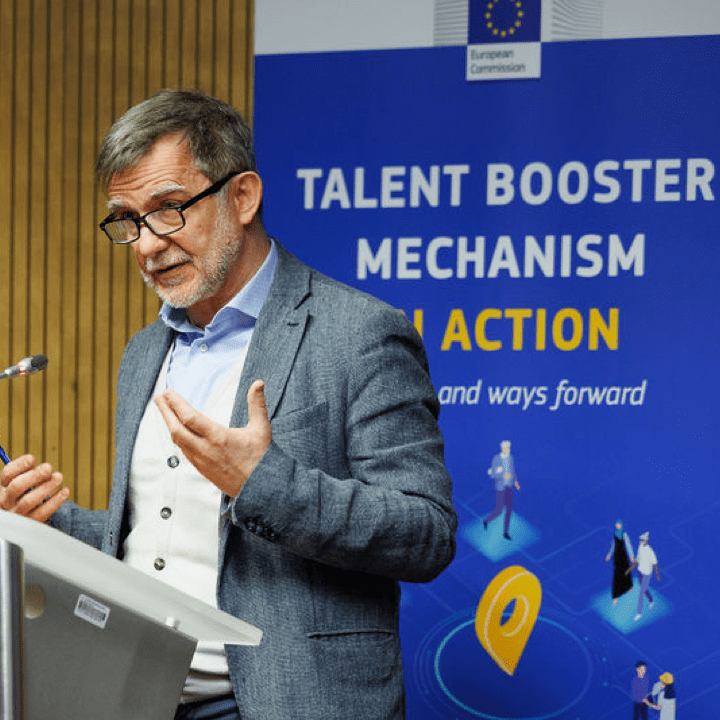
Wherever EU citizens choose to live, Cohesion Policy is there to help improving living standards and supporting structural adjustments. The Talent Booster Mechanism launched in 2023 is part of Commission’s efforts to ensure all citizens have a ‘right to stay’.
Dr. Arnstein Aassve, Professor in Demography at Bocconi University, helped the audience understand the evolution of the age pyramid in EU societies, the important differences across Member States and its implications for modern welfare states. At the heart of his keynote speech is the concept of ‘resilience’ and the strong correlation between resilient individuals and communities.

It is not about bouncing back to previous fertility rates. It’s about creating a virtuous spiral for building resilient communities that invest in human capital, education, health services and social inclusion.
Highlights
For an overview on voices captured during the event, please watch the video below:
Shaping regional competitiveness and attractiveness for thriving communities
In the Political Guidelines for the European Commission 2024-2029, the ‘right to stay’ is the ultimate goal of a strengthened cohesion and growth policy that addresses regional disparities and ensures that citizens have the freedom to decide where to live. To ensure this, reforms and investments are crucial for EU regions.
Nicola De Michelis, acting Deputy Director-General of DG REGIO, put this into context, explaining that the essence of EU Cohesion Policy is helping regions to become attractive places to live and work and ensure imbalances are tackled to avoid social and political discontent.
Central to adapting to the new realities on the ground are the priority areas recalled by Gabriella Gerzsenyi, Vice-Chair of the Committee on Regional Development in the European Parliament: affordable and accessible housing, adequate jobs, mobility opportunities for marginalised groups, including people with disabilities. Activating these groups in the labour market and enhancing their social inclusion remains an essential aim of the EU’s social model and our social market economy.
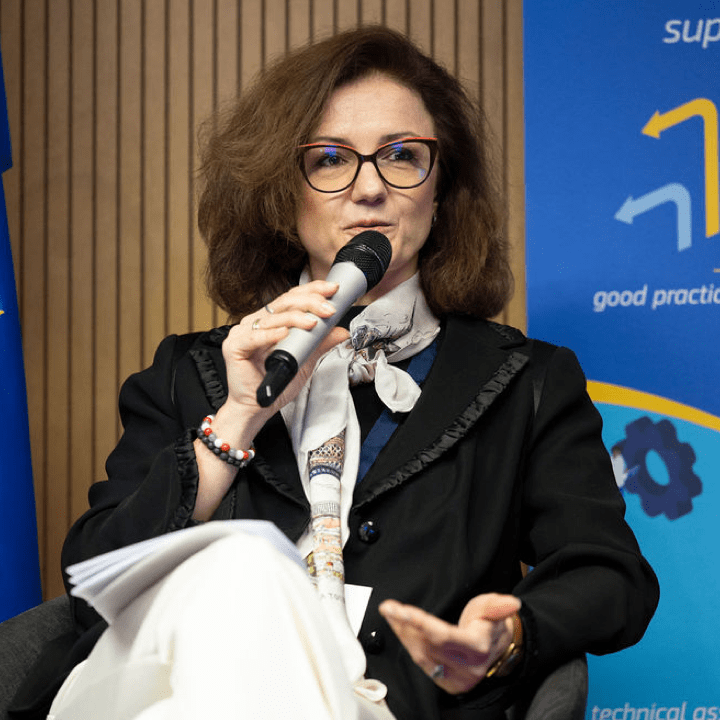
When we go back to the original purpose of Cohesion Policy, when thinking about territorial cohesion and reduction of disparities, the end result is giving people the freedom to exercise their ‘right to stay’.
Lamia Kamal-Chaoui, Director of the Centre for Entrepreneurship, SMEs, Regions and Cities at the OECD, highlighted the role of regions in contributing to national competitiveness and in addressing social, green and digital transitions. Whilst it took time to recognise that demographic change is a shared and growing issue, there is now consensus across OECD countries that the right set of tools to bring solutions to territories needs to include place-based regional policies.
Simone Großner, State Secretary for European Affairs in Saxony-Anhalt, highlighted the importance of creating an environment where firms can thrive, which includes a better-educated workforce and less regulation. There is a need for strong governance structures and leadership to be able to address local issues.
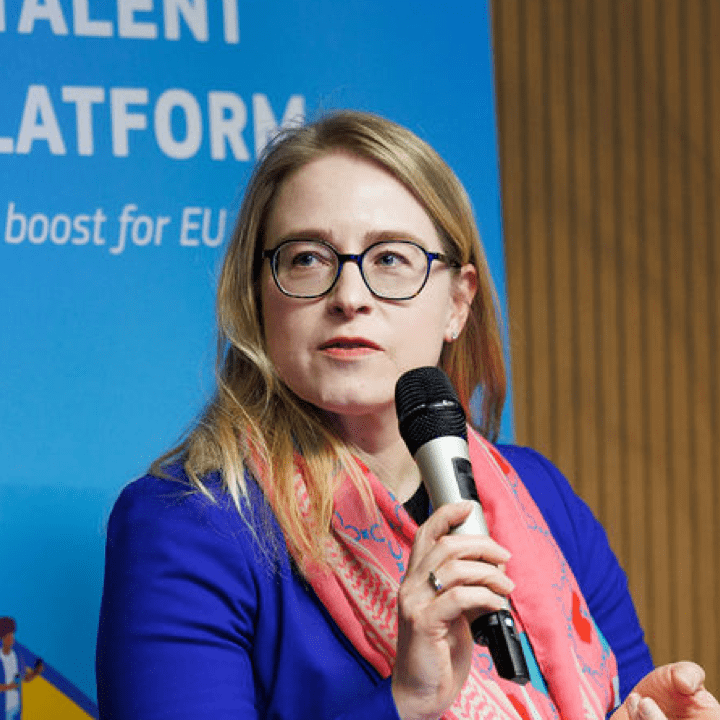
Cohesion Policy works in Saxony-Anhalt and helped create the right conditions for people to stay. We need a Cohesion Policy that is well funded to continue making an impact.
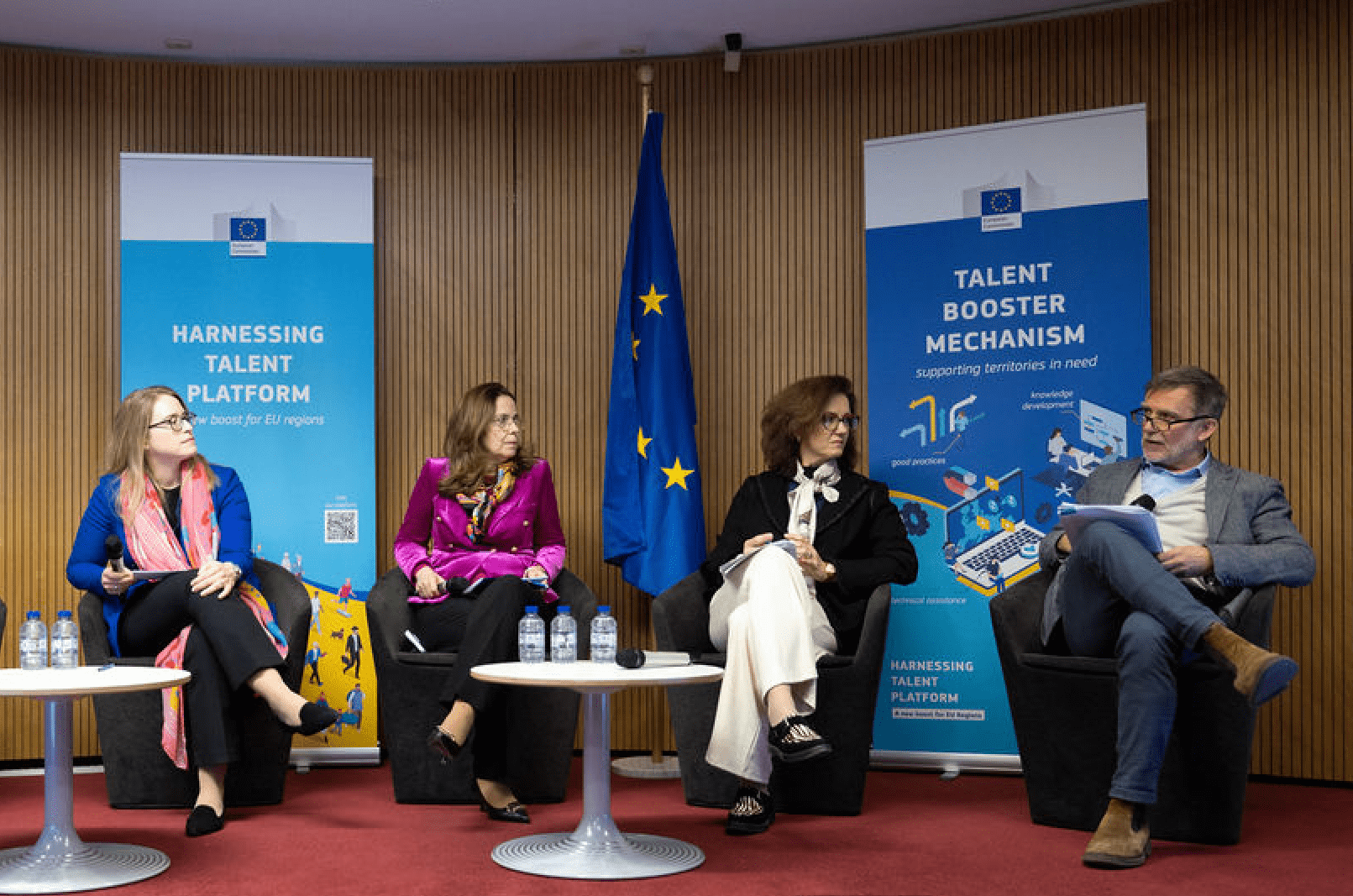
Boosting talent and increasing economic opportunities for all in EU regions
Representatives from DG REGIO and DG EMPL as well as regional authorities discussed how local stakeholders benefit from the Talent Booster Mechanism to address challenges such as skills gaps, in regions where a shrinking working age population and youth outmigration have consequences on the capacity to attract investments and to provide services to the local population. These regions have a shared need to foster stronger innovation ecosystems which are essential for harnessing talent as they create environments where creativity, collaboration and entrepreneurship can thrive.
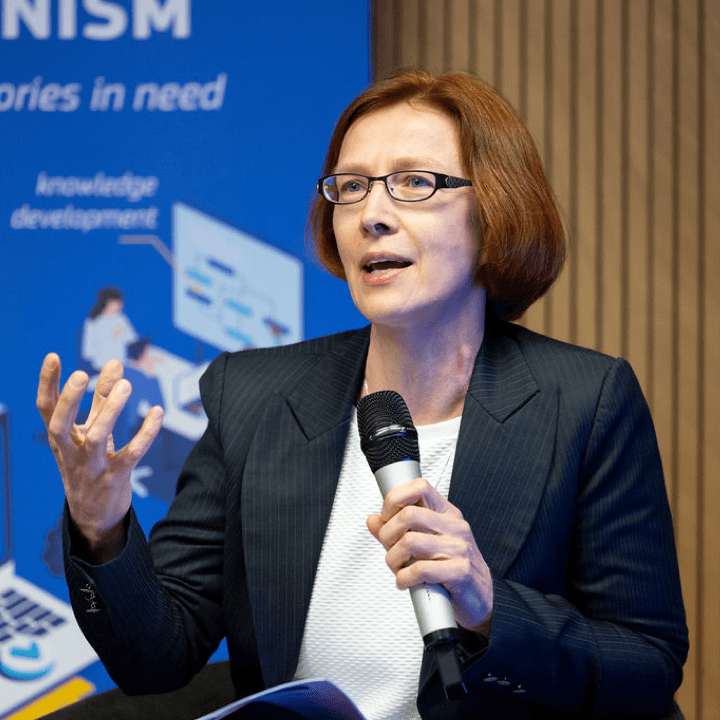
The Talent Booster Mechanism concretely helps EU regions in need with technical assistance, through pilot projects from the Technical Support Instrument, I3 Instrument and European Urban Initiative. These contribute, to tackle the structural problems whilst supporting reforms and innovative solutions for competitiveness, high quality jobs and public services.
Manuela Geleng introduced the Union of Skills Communication, the European Commission blue print for a new and unified vision to improve high quality education, training, and lifelong learning as solutions to better address demographic change. Investing in skills is essential for the competitiveness of regions and for a resilient EU. The main objective of the Union of Skills is to ensure that every EU citizen has access to learning opportunities, both at work and in life. To do this, there is a need to enhance collaboration among Member states, educational institutions, industries and social partners, but also to target investments in education infrastructure and ensure the cross-border recognition of qualifications.
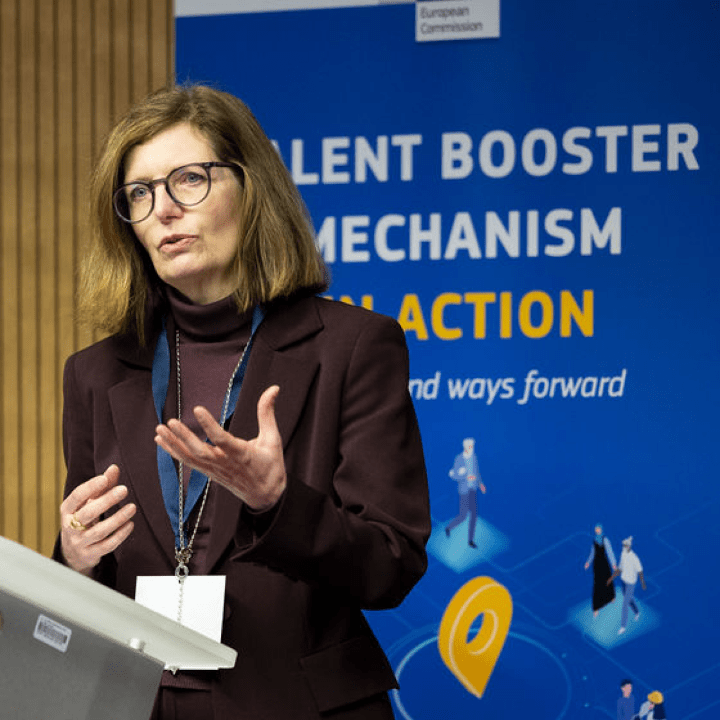
To develop talent and to retain talent, we all need to work together at European, national, regional and local levels. Only by joining forces we will be able to address the challenges of competitiveness and innovation while preserving social cohesion. Everyone in our Union should be able to thrive in their lives and at work.
Challenges and solutions to harnessing talent were presented by three beneficiaries of the Talent Booster Mechanism who shared insights from their respective projects:
-

Vest region in Romania, TBM Pillar 1
Luciana Fârlea, Head of the Vest Regional Planning, Analysis and Forecasting Office in Romania, shared insights from the Technical Assistance Pillar 1, emphasising that talent attraction and retention is a complex issue that makes it challenging to prioritise areas of action, especially in the context of scarce and competing resources. With the support received, the Vest region has developed objective criteria to prioritise initiatives based on expected impact, synergies with other initiatives, availability of funding, and stakeholders’ agreement. -

Extremadura region in Spain, TBM Pillar 3
The Spanish region of Extremadura participates in two projects supported by the Technical Support Instrument. Coordinator Annabelle Favreau stressed the importance of learning from other regions, explaining how partnership, knowledge sharing, and study visits have enriched the region’s approach towards supporting entrepreneurship. Extremadura is now drafting a new programme aimed at boosting the adoption of artificial intelligence and deep tech solutions inspired from lessons learnt with the TSI. -
 Fostering innovation requires supporting both technical and entrepreneurship skills across the entire educational spectrum. Using the GreenStep project he coordinates in Czechia as an example, Luboš Komárek showcased how the I3 instrument helps create interlinkages across European regions and supports the development of deep tech solutions. This comprehensive approach ensures that individuals are equipped with the necessary skills to drive innovation and economic growth.
Fostering innovation requires supporting both technical and entrepreneurship skills across the entire educational spectrum. Using the GreenStep project he coordinates in Czechia as an example, Luboš Komárek showcased how the I3 instrument helps create interlinkages across European regions and supports the development of deep tech solutions. This comprehensive approach ensures that individuals are equipped with the necessary skills to drive innovation and economic growth.
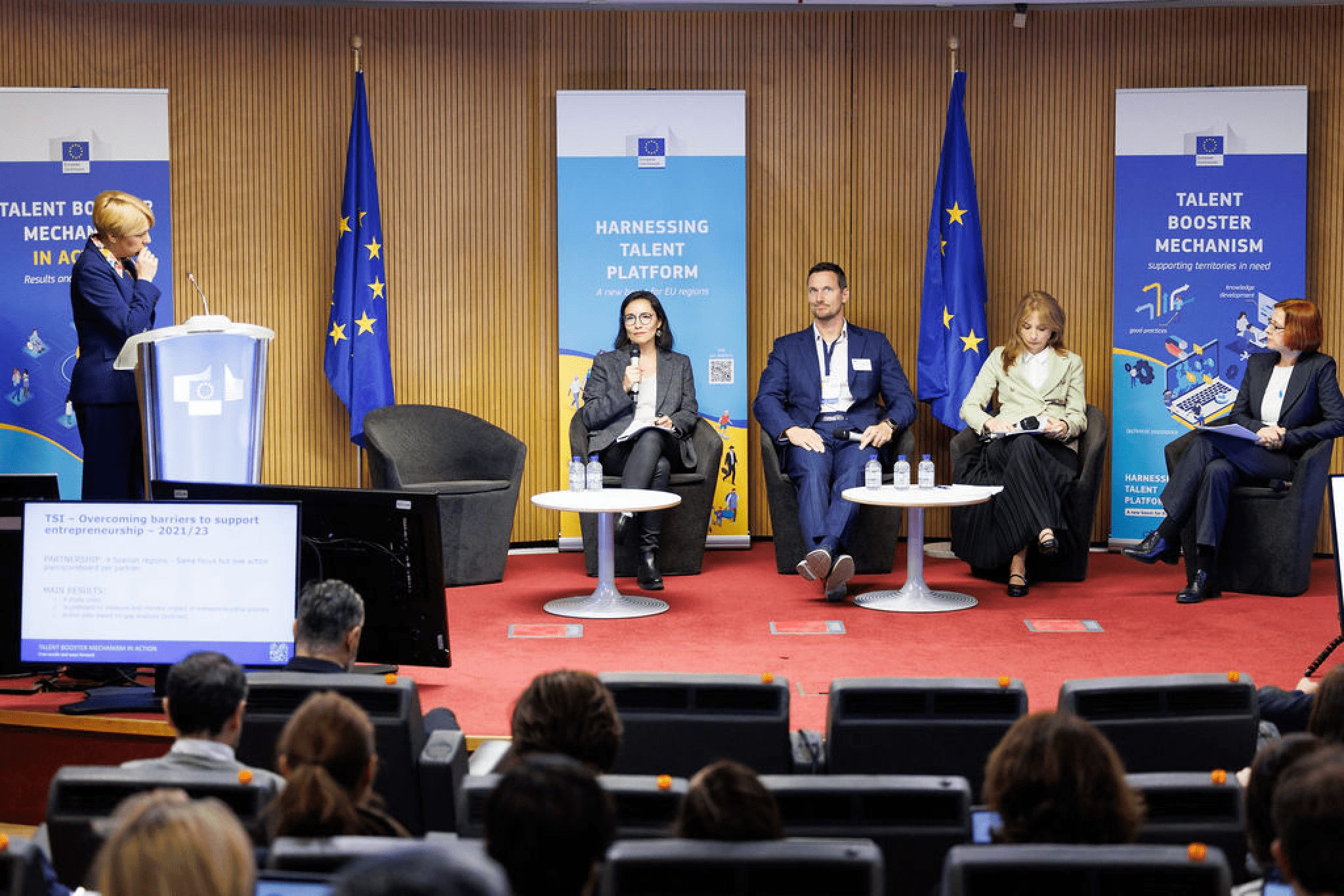
Knowledge sharing for informed policy making
Informed policy making is crucial when designing place-based solutions for harnessing talent and better managing the changes that come with a shrinking working age population.
Virginie Laye from the HTP Secretariat presented the revamped Harnessing Talent Platform and highlighted the resources available to regional and local stakeholders, in particular the recently launched Knowledge Repository which includes a Knowledge Hub, academic articles and good practices.
Representatives from the Joint Research Centre (JRC) and the ESPON Programme presented some of the analytical resources produced under Pillar 8 of the Talent Booster Mechanism, which collects and presents data and analytical knowledge to support evidence-based policies on demographic change.
Lewis Dijkstra, Team Leader of the Territorial Development Unit of the Joint Research Centre provided an overview of recent and upcoming JRC work which supports the Talent Booster Mechanism, notably the work on developing a definition of EU functional rural areas and the work on the Demography, Economy, Land use, and Interaction Model (DELi). In this context, he also announced the upcoming launch of a publication on "The Changing Face of Europe".
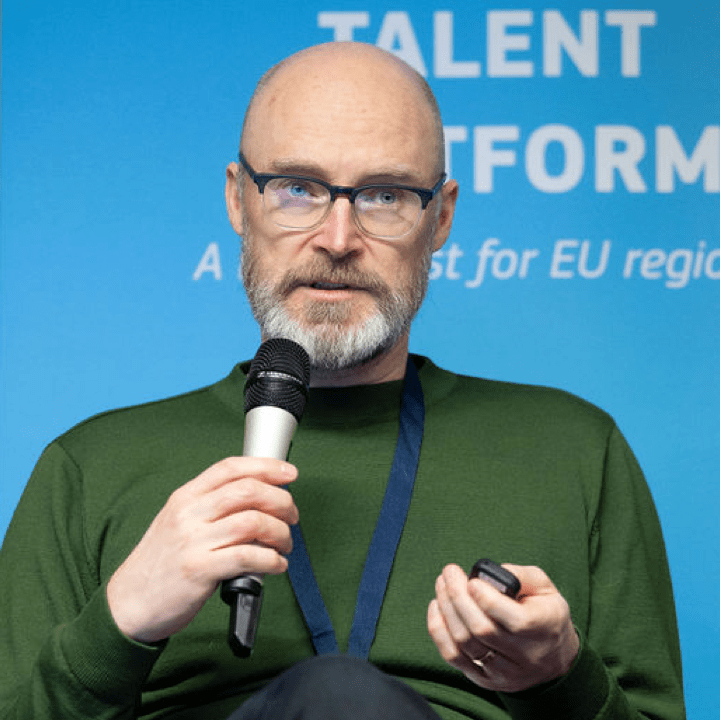
Very soon we will have much more the problem to fill jobs rather than to create jobs... so making sure that we have a high skilled labour force, and a high quality of life will be key.
As part of the ESPON Programme, Research and Policy Manager Zintis Hermansons introduced the audience to the DESIRE project, which delivers a comparative outlook on how the provision of services in lagging regions, and regions with special needs, is addressed in European countries. He focused on the urban-rural divides and the concept of "inner peripheries".
Michele Calabro (EUREGHA) and Rita Marques (Porto Business School) were representing the Working Groups set up under the Talent Booster Mechanism. Their intervention provided an overview of the mission and perspectives of the network of experts set up to collect and share knowledge, policy guidelines and recommendations for their EU peers. Stakeholders will soon benefit from a number of outputs that the experts are working on, including a comprehensive catalogue of good practices as well as recommendation papers focusing on improving the provision of health services, enhancing digitalisation, fostering research and innovation as well as improving access to essential services and quality of life to enforce the ‘right to stay’ for European citizens.
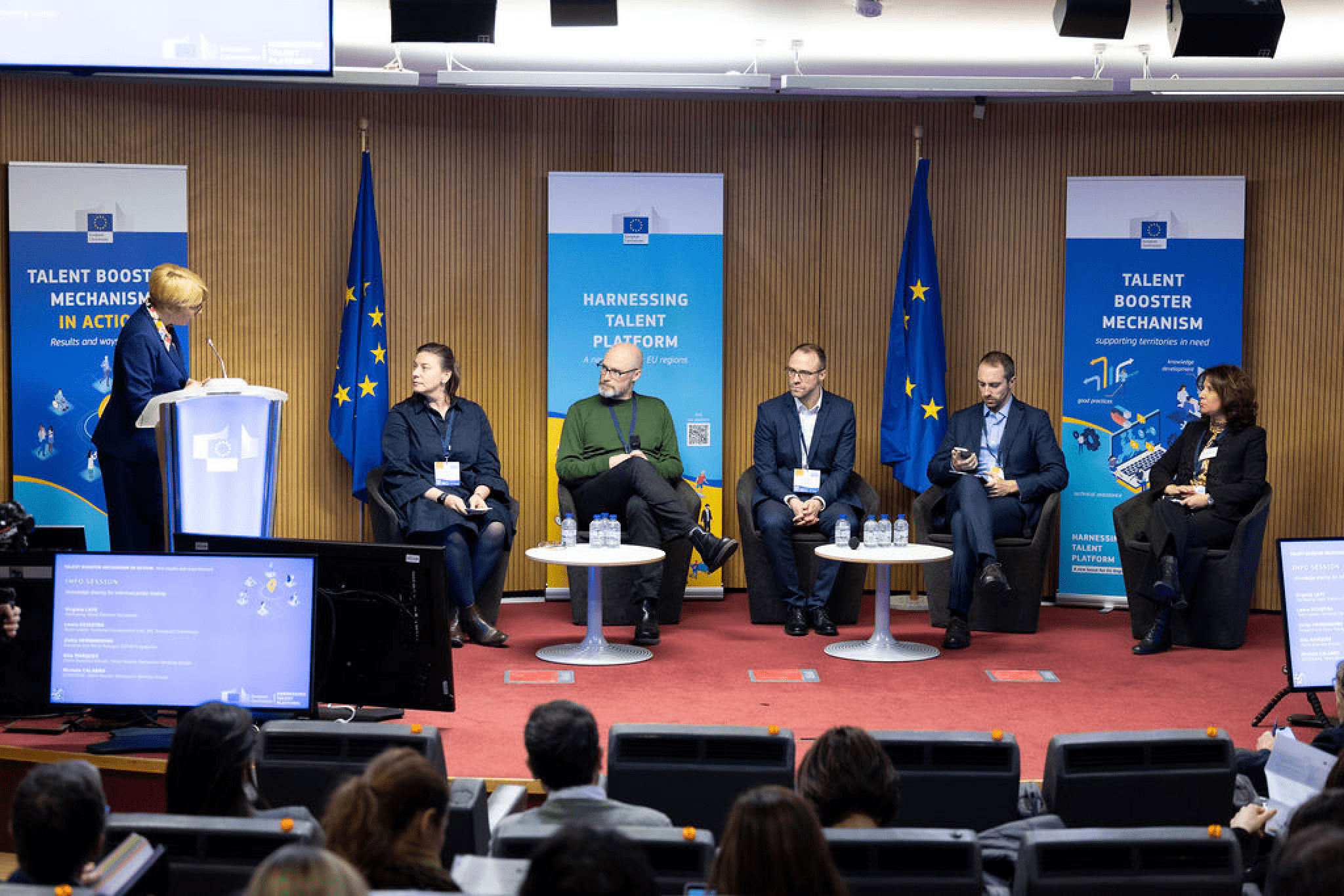
Adapting to demographic change on the ground
Under Pillar 2 of the Talent Booster Mechanism, the OECD is helping selected regions facing attractiveness issues to adapt to the demographic transition through tailored and place-based policies. Their work focuses on areas that are particularly impacted by demographic change: land us and spatial planning systems, infrastructure investments, service provision and sub-national government finances.
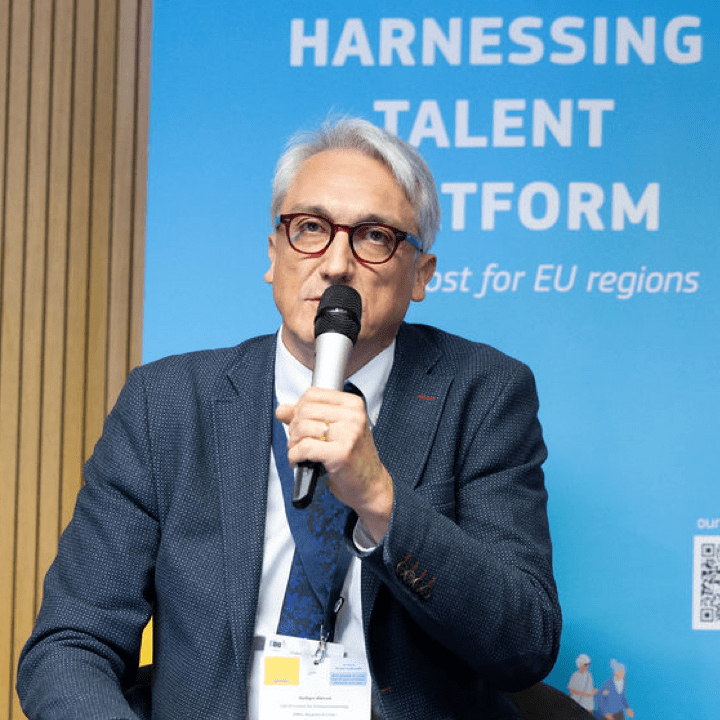
If we are not adapting to demographic change, the attractiveness of our regions is going to suffer.... We are trying to help regions to adapt to demographic change with the idea that this is really important for their capacity to retain or to attract talent going forward.
Three panellists presented their project experience showcasing solutions to revitalise shrinking areas through various reforms, investments and community-led initiatives:
-

Castilla y Leon region in Spain, TBM Pillar 2
Angel María Marinero Peral, Secretary-General, Regional Ministry Environment, Housing and Planning of the Regional Government of Castilla y León presented first insights from the Pillar 2 pilot project highlighting that demographic constraints have a transversal nature. He stressed the importance of prioritising transportation, housing, education, health, and social services. As part of their initiatives, Castilla y León has been renovating publicly owned housing in rural villages to enhance affordability and integrate renewable energy solutions. Between 2016 and 2024, 552 houses in 501 villages were renovated. -

MAG-NET project from Celje, Slovenia, TBM Pillar 5
According to Monika Tominšek, Coordinator of the MAG-NET project under the European Urban Initiative, part of Pillar 5 of the Booster, presented by the project coordinator Monika Tominšek, shows that a city’s attractiveness for talent goes beyond jobs and is shaped by quality of life. The MAG-NET project identified five key focus areas for attracting and retaining talent: affordable housing, sustainable mobility, Industry 4.0, urban vibrancy, and energy communities. To address the identified challenges, the MAG-Net model was introduced, combining Real Life Learning Labs (RLLL), co-creative spaces (hubs as physical spaces for innovation and collaboration), as well as a collaborative digital platform for knowledge sharing and broader participation. -
 Guillaume Corradino, Director of Euromontana and member of the ESPON project RURALPLAN - Innovative planning in shrinking societies, presented how the project aims to address the challenges of improving quality of life in mountain regions facing issues such as lack of diversified job opportunities, inadequate mobility options, and limited access to services and housing. Solutions based on innovative planning for shrinking areas are available in an online toolbox. Keys for unlocking the potential of these areas include creating connections between young people and local businesses, fostering intergenerational ties, and breaking bureaucratic barriers to drive meaningful change.
Guillaume Corradino, Director of Euromontana and member of the ESPON project RURALPLAN - Innovative planning in shrinking societies, presented how the project aims to address the challenges of improving quality of life in mountain regions facing issues such as lack of diversified job opportunities, inadequate mobility options, and limited access to services and housing. Solutions based on innovative planning for shrinking areas are available in an online toolbox. Keys for unlocking the potential of these areas include creating connections between young people and local businesses, fostering intergenerational ties, and breaking bureaucratic barriers to drive meaningful change.
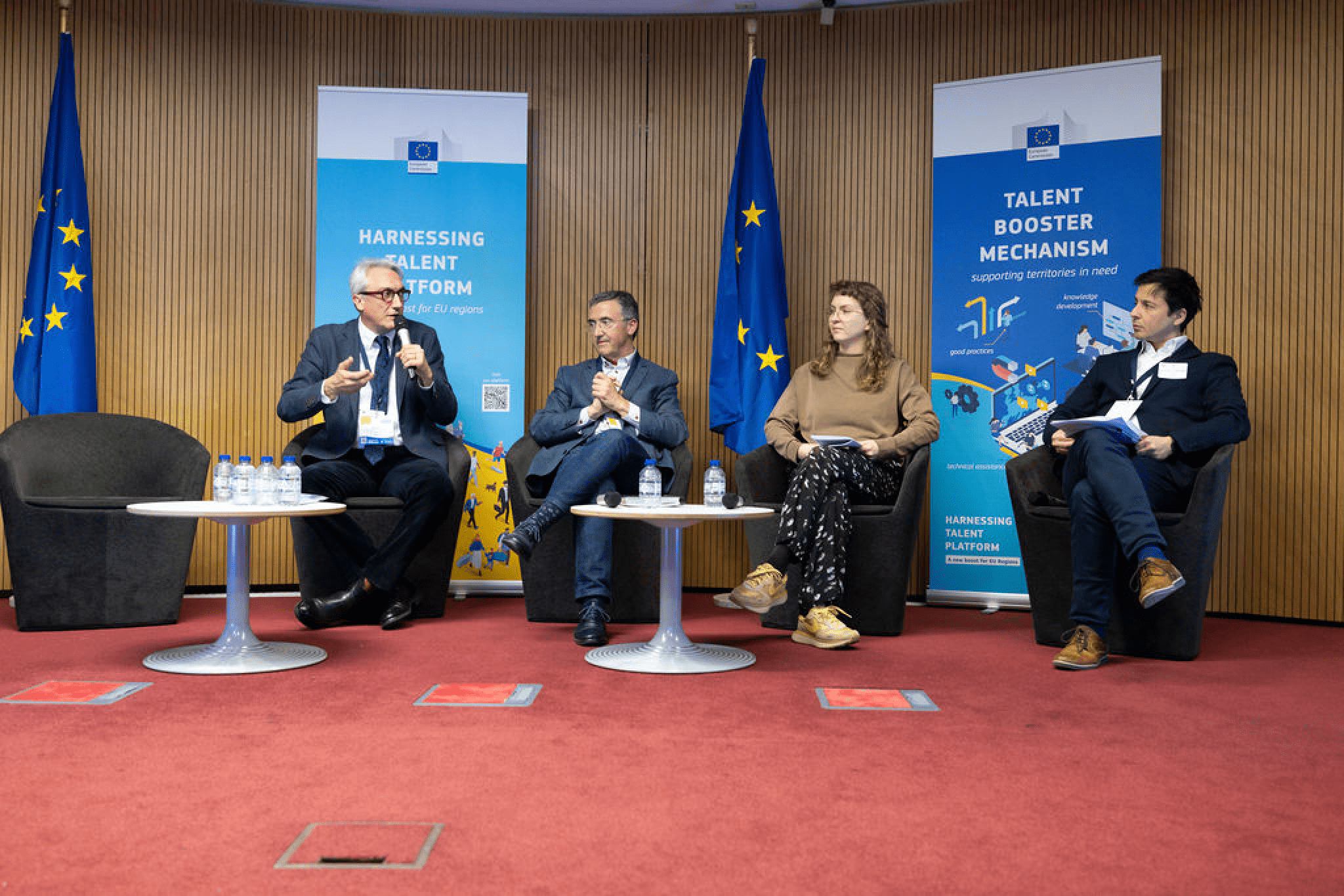
Tackling the demographic transition
Reflecting on the lessons learnt from supporting regions caught in a talent development trap and beyond, representatives from DG REGIO, the European Committee of Regions and European Economic and Social Committee discussed how Cohesion Policy could better address demographic challenges

Demographic change affects territories in a very different way… Territorially sensitive policies are crucial for supporting regions in need: place-based approaches and integrated territorial development supported by Cohesion Policy are key for the future.
This session highlighted that demography must be at the centre of policymakers' minds alongside other priorities such as EU competitiveness and strategic autonomy, as every region and place matters and can contribute to EU’s future resilience.
Kadri Uustal, Head of Unit ‘Cities, Communities, People’ from DG REGIO concluded the event by sharing the following takeaways:
-
 Importance of data: Understand the local demographic dynamics and seek technical support for a proper diagnosis. Every solution starts with an accurate understanding of the problem, its likely evolution and impact on mid to long-term regional attractiveness and resilience.
Importance of data: Understand the local demographic dynamics and seek technical support for a proper diagnosis. Every solution starts with an accurate understanding of the problem, its likely evolution and impact on mid to long-term regional attractiveness and resilience. -
 Integrated solutions: Demographic challenges are complex, requiring comprehensive solutions across several intervention sectors such as essential services, housing, connectivity and economic diversification, etc.
Integrated solutions: Demographic challenges are complex, requiring comprehensive solutions across several intervention sectors such as essential services, housing, connectivity and economic diversification, etc. -
 Learning from others: Embrace the experiences of others. Innovation often involves ‘borrowing’ successful ideas rather than ‘reinventing the wheel’.
Learning from others: Embrace the experiences of others. Innovation often involves ‘borrowing’ successful ideas rather than ‘reinventing the wheel’. -
 Cooperation: As population declines, cooperation becomes essential. Young people need not only services but also access to culture, community engagement, and empowerment. Collaborating with neighbouring regions facing similar challenges can provide mutual benefits.
Cooperation: As population declines, cooperation becomes essential. Young people need not only services but also access to culture, community engagement, and empowerment. Collaborating with neighbouring regions facing similar challenges can provide mutual benefits. -
 Engaging with the locals: Empowering and involving locals in the transition process helps create a sense of belonging and ownership.
Engaging with the locals: Empowering and involving locals in the transition process helps create a sense of belonging and ownership.
Cohesion Policy is the ideal instrument to support these efforts, offering place-based strategies and investments to reinforce territorial cohesion and to enforce the ‘right to stay’.
The Talent Booster Mechanism will continue to support regions in the months to come. It will build on the perspectives gathered throughout the event and continue to make available relevant resources and findings emerging from the support on the ground, allowing for peer learning to strive via Working Group activities and the community to grow via the Harnessing Talent Platform.
You are invited to share your insights and good practices with us via this form.

Event Agenda
Media
Watch the recording of the plenary session
All photos from the event can be found on the official REGIO Flickr account
